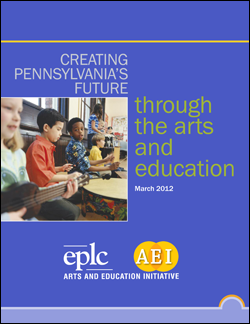Creating Pennsylvania’s Future Through the Arts and Education
44 pages, March 2012. The Education Policy and Leadership Center, 800 North Third Street, Suite 408, Harrisburg, PA, 17102, (717) 260-9900, www.aei-pa.org.
Download:
![]() Creating Pennsylvania’s Future Through the Arts and Education (2.9Mb)
Creating Pennsylvania’s Future Through the Arts and Education (2.9Mb)
This report—released by the Arts and Education Initiative of the Pennsylvania-based Education Policy and Leadership Center (EPLC)—urges state policymakers to make access to high-quality, comprehensive, standards-based arts education a priority for K-12 students in Pennsylvania. The report includes nearly 40 recommendations for state policymakers and other audiences and seeks to improve support for the arts and arts education in Pennsylvania's 500 school districts and diverse community settings.
The report follows a year-long process of discussions by a 32-member Study Group, a comprehensive review of relevant public policies in Pennsylvania and other states, eight regional community forums, and surveys of several stakeholder groups by EPLC.
From the Conclusion:
Now more than ever, the complexities of the world in which we live—and the world our children will inherit—demand that learners of all ages be well-educated, well-rounded creative problem-solvers. The arts make unique contributions to the development of a well-educated citizenry, as documented throughout this report.
To secure a healthy, prosperous and vibrant future for all Pennsylvanians, the Commonwealth needs to become a state of creativity. And for Pennsylvania to become a state of creativity, our citizens need—and our leaders need to provide—policies that promote the arts, culture and heritage.
This report makes recommendations designed to advance five key goals:
- Citizens of all ages in all Pennsylvania communities have access to a rich and diverse array of arts and cultural experiences.
- All PK-12 students, including those with disabilities and those who are gifted, are provided a high-quality, comprehensive, sequential, standards-based arts education that includes visual arts, music, dance, and theatre.
- All PK-12 arts teachers and elementary and special education teachers who provide instruction in the arts are highly qualified and effective.
- Artists and arts organizations effectively collaborate with schools and educators to strengthen the arts provided to all PK-12 students and the arts and cultural experiences available to citizens of all ages.
- Artists, arts organizations, arts education professional associations, and other arts education stakeholders and community leaders effectively collaborate to promote and sustain advocacy efforts to increase policymaker and public support for public policies that will strengthen standards-based arts education opportunities provided to all PK-12 students and the arts and cultural experiences available to citizens of all ages.
The first goal has the potential to broaden the way adults experience life in our communities and increase their preparedness for success in our complex, global environment. The second and third have the potential to revitalize the education of our children, increasing their opportunities for successful adulthood. The fourth has the potential to strengthen the bonds between our schools and communities, with each adding value to the other. And the fifth is essential if we are to have any real hope of achieving the first four.
These goals will not be met simply because they are worthy or important—or even vital. They will be met if policymakers understand that their constituents—the citizens of this Commonwealth—expect them to enact, implement, enforce, and provide adequate funding to support policies that will result in achieving these goals.

